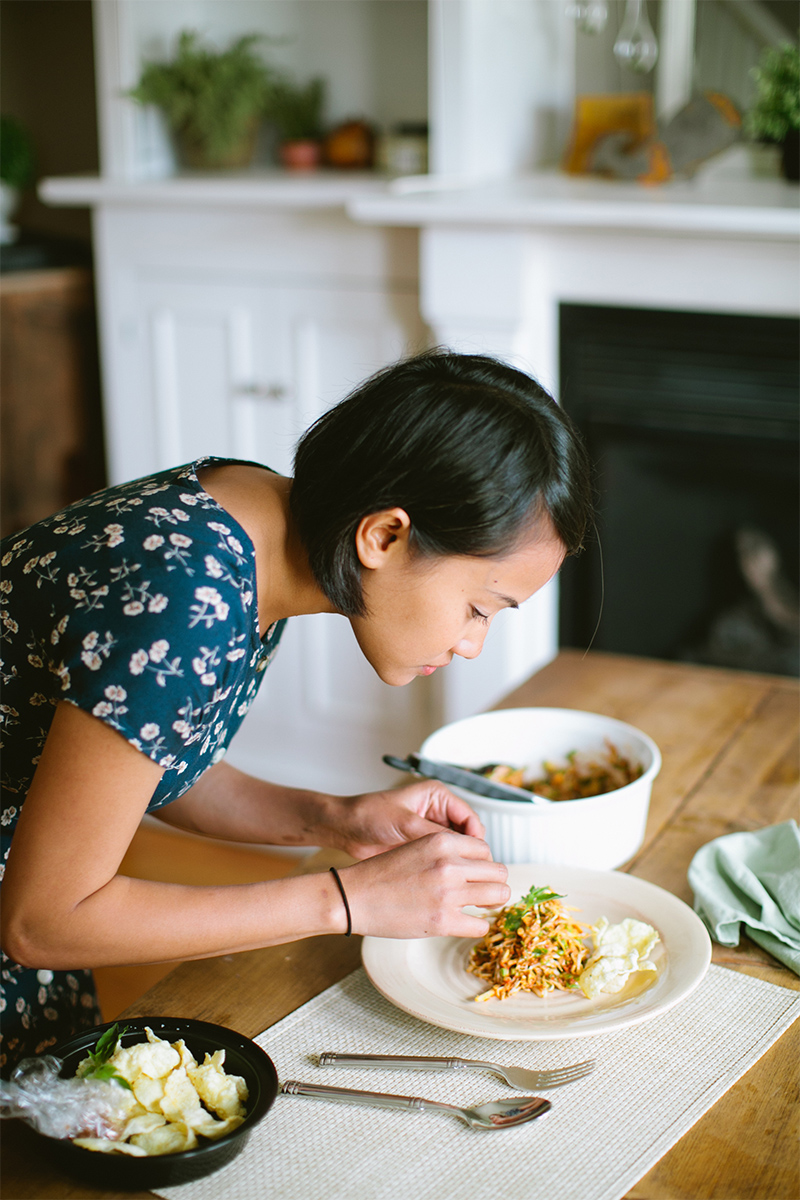Retno Pratiwi, the Queen of Indonesian Street Food

Photo courtesy of Brian Samuels Photography
If you’re unfamiliar with Kitchensurfing, you’re more than likely missing out on some of Boston’s most exciting young chefs. Besides their private chef services (which are highly affordable for an at-home luxury), they’re also responsible for some of the most exciting pop-up restaurant experiences, such as Sam Monsour’s “Future of Junk Food” series. One young talent, Retno Pratiwi, seems primed for much bigger things, though.
Pratiwi has been honing her skills through Kitchensurfing for the past year-and-a-half in private kitchens in New York and Boston, as well as her Kaki Lima pop-ups that showcase the street food of her native Indonesia. Now, her and her partner, Peter Gelling are looking to open their first brick and mortar restaurant sometime next year. Born in Jakarta, the second eldest of eight siblings, Pratiwi has been learning and perfecting the nuanced fare of Indonesia from an early age with her East Javanese grandmother. Now she’s ready to introduce those flavors and philosophies to a much larger audience. We caught up with Pratiwi to discuss her career since graduating from the Cambridge School of Culinary Arts, the basic principles of Indonesian cuisine, and which neighborhood she plans on building her first official Kaki Lima restaurant.
How long have you known that you wanted to be a cook?
Growing up I had so many siblings (13) and I was cooking for them since I was probably seven or 10, just helping my mom and my grandmother. I didn’t really know if I wanted to cook, but I did know how to do if from an early age. But yeah, I think when I moved that’s when the idea really took hold. I stayed in Jakarta until I was about 16, then I moved to Ottawa with my uncle and his family and and there was no Indonesian food out there. I became interested in restaurant management or a food business where I could promote Indonesian food. So, I started to think about having my own restaurant when I was in high school. It became something that was always in my mind.
Besides your work at Kitchensurfing, what other restaurants have you worked at?
I staged at State Park for about three months. So it was like kind of my real introduction to working in a kitchen. I was working on the line for three months. It was a really, really great experience. They — the same team behind Hungry Mother—were all very professional and I learned so much.
Do you think that your Kitchensurfing pop-ups have prepared you to open your own place?
Well, I’m still perfecting my dishes. Going with Kitchensurfing has been great because I can see how my customers like my food. I just like the feedback they give me, it’s really great support for me. But yeah, knowing what people like and how people react to my food, I think it’s prepared me on some level to open my own restaurant. Of course the more you do it, the more you learn, so I still need to do a lot more cooking.
Do you know of any other Indonesian food right now in Boston?
There is a Malaysian restaurant, but I don’t know if there is a single Indonesian restaurant. There are a lot of Indonesian communities. Actually I joined the the first Indonesian Festival last year in Copley Square. That was the first time I realized just how many Indonesians there were in New England.
What do people need to know about Indonesian food?
That’s a great question. First of all, Indonesian food is so broad. There are so many kinds because there are so many islands of Indonesia. Just on the bigger islands, there are subcultures within the various cultures. Traditionally though we us a lot of hard, woodsy spices, herbs, shallots, and fish. We use a lot of coconut milk, coconut water, coconut flesh, coconut oil. And then we have tempeh, which is largely consumed by a vegetarian audience here in the States. Indonesian food is very diverse in every way. There are more than 20 types of rendang. And then tumpeng—the celebratory [cone-shaped] rice meal—there’s seven different tumpengs. But the common ground is we use a lot of fresh herbs and spices ground in a mortar and pestle.
Are there any other cuisines you could compare it to?
The Indonesians get influence from the Chinese, from India, from Thailand, from Portugal, and the Dutch. It was a major trading post, so we got influence from a number of different cultures. I know for sure that when I eat Indonesian food, it just tastes different; I can taste all the different spices and flavors.
Are a lot of the things you’ve cooked already at these pop-ups, is that the kind of stuff that people can expect to see on the menu?
Yes, but that’s something I still want to see which food that people prefer. I’m mainly focused on doing Indonesian street food and traditional Indonesian food that people normally cook at home on special days or special occasions.
How did you come up with the name Kaki Lima?
Literally it’s translated into five legs. Kaki lima are street vendors that pull carts with three big wheels— and their two feet—that make up the traditional street food stalls popular in Java. And street food is just called kaki lima in Indonesia; something easy and portable that people eat it in everyday life. I love street food and used eat it all the time, even more than I ate my grandma’s food. It’s very familiar with people that have visited Indonesia and it’s a good introduction to Indonesian food.
How serious are you about opening your own place?
Very serious! We’re just trying to find investors and people to support us. But it’s our dream to have our own place. Not just a restaurant, but a place that people can learn about Indonesia through its food, the music, and its diverse cultures.
What kind of inroads have you made with investors as far as trying to get something started?
First, we went back to Indonesia last year and talked to possible investors. Now I’m thinking about philanthropists, because I need people that believe in Indonesian culture. I need people that are not just in for the money, but also for the food and for the history of Indonesia. So we’re still looking for the perfect people to work with us, but through Kitchensurfing, we’ve been put in touch with a few potential investors. But for right now, we’re really more focused on finding our audience.
Do you have any idea of where you’d want to build?
At first, we were thinking of Inman Square, but I think it’s a little too expensive for us right now. So, we’re going to do it in East Boston, which is where we live and where we do the majority of our pop-ups. The community is very supportive of us and it’s a great neighborhood.


